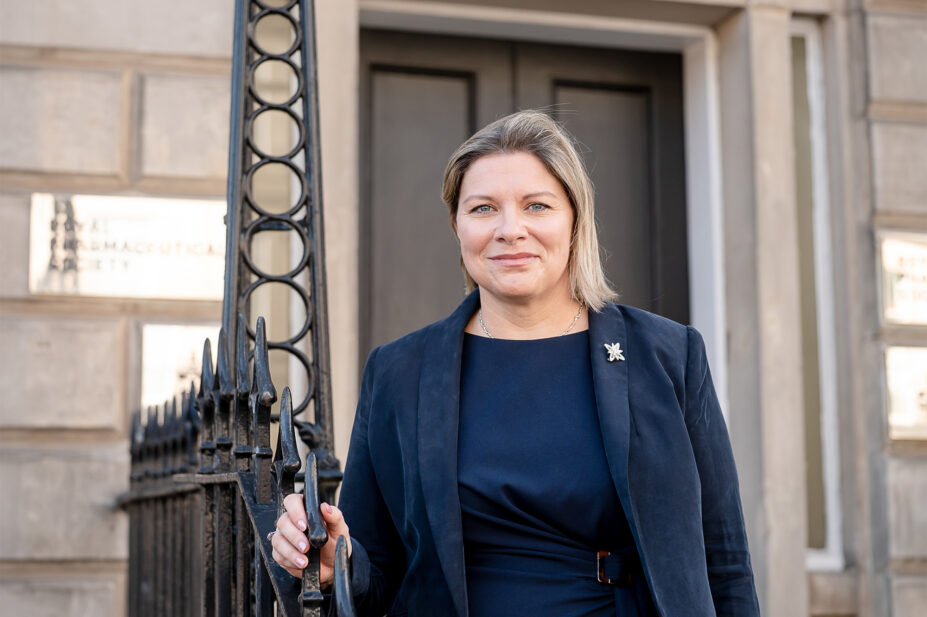
Anna Moffat Photography
The Royal Pharmaceutical Society’s (RPS’s) Scottish Pharmacy Board (SPB) met at the Society’s Edinburgh office on 28 February 2025. On the agenda was the Society’s position on the facilitated sale of Pharmacy (P) medicines, discussions on public affairs and the Society’s work plan, and updates on constitution and governance proposals.
Apologies were received from board members Catriona Sinclair and Josh Miller.
Present at the meeting were Claire Anderson, president of the RPS; Ross Barrow, RPS Scotland head of external relations, Paul Bennett, chief executive of the RPS; Amandeep Doll, RPS head of engagement and professional belonging; Fiona McIntyre, RPS Scotland practice and policy lead,; Zahra Al-Momen, RPS professional engagement lead — North of England and Scotland; Liz North, RPS associate director of strategic communications; and Laura Wilson, RPS director for Scotland.
Facilitated sale of P medicines
Laura Wilson, director for Scotland at the RPS, noted that board members had received a report on the facilitated sale of P medicines prepared by the science and research team, which set out three options for the Society’s future position on this. These were:
- Maintain the policy that has been in place since 1950;
- Change RPS policy and support facilitated sale including endorsement of regulatory guidance; or
- Change RPS policy and allow facilitated sale in certain conditions and with built in safeguards.
Board chair Jonathan Burton said that option C acknowledged that “this is the situation we are in and what we need is strong guidance”.
“I feel we can pick option C, but I think we need to make quite a strong statement that there are inherent risks in current system and always have been, especially around opiates,” he said.
“Where we can add value is high-quality professional guidance.”
Board member Audrey Thompson said that it was “important to recognise that this is happening already”.
“The position is not to say: you must do this, just that it is an option — we will help you to do this in the most appropriate way for your practice, and help public to get medicines in the safest way,” she added.
Board member Richard Shearer said: “Option C, with additional professional safeguards, would provide more reassurance.”
Summing up the discussion, Burton said there was “consensus that option C way forward, but there is work to be done on comms”.
Inclusion and diversity update
Zahra Al-Momen, professional engagement lead at the RPS, and Amandeep Doll, head of professional belonging at the RPS, gave an update on inclusion and diversity work.
The Action in Belonging, Culture and Diversity (ABCD) group has been having discussions around LGBTQ+ topics in the MPharm, saying that people often revert to stereotypes when teaching and that work was being done to help map teaching to learning outcomes. This was being taken to the Pharmacy Schools Council and would be launching officially in June 2025. Later, the group plan to do similar around other areas, including disability and race.
They told the board meeting that work on the differential attainment gap was ongoing, with another meeting planned for March. Their initial work would be England focused, but the team would be meeting NHS Education for Scotland (NES) to talk about how they can get involved.
Burton noted that he had attended previous ABCD meetings and found they “give you a wider window into membership and daily battles some face; it’s good to listen and participate”.
Public affairs update
Ross Barrow, head of external relations at RPS Scotland, gave an update on the current political environment in Scotland and how that feeds into the Society’s public affairs plan. Barrow noted that the next Scottish Parliament election was planned for 7 May 2026. He said the RPS’s Scottish election manifesto would launch at the Scottish headquarters in Edinburgh on a date to be confirmed.
Since the last meeting, the Society had held a medicines shortages drop-in event in Holyrood in November 2024. Barrow said that 16 MSPs came, many of whom had personal stories of experiencing shortages. In January 2025, 21 MSPs came to a drop-in event on access to patient records. In January 2025, 12 MSPs came to a reception on the ‘Daffodil standards for community pharmacy‘, sponsored by Jackie Bailley MSP.
Greener pharmacy toolkit
Wing Tang, head of professional standards at the RPS, gave a demonstration of the Greener Pharmacy Toolkit, commissioned by NHS England, which “helps to achieve our policy for pharmacists to reduce their impact on the environment”. The toolkit will be available outside England, he said, adding that it is hoped there will be funding for Scottish and Welsh adaptations in future.
Early adopters have been invited to use ahead of launch, he added, with the hope that early adopters will provide case studies for launch, which is planned for around April 2025.
Board member Lucy Dixon said the toolkit was “fabulous — I was one of the people who tested it”. Dixon noted that as well as certification, the toolkit produces an icon that can be used on websites, and asked how long recognition lasts.
Tang said that this was to be decided. “We would like pharmacies to come back and improve, so an annual check in would be good but we recognise it would be challenging: everybody is pushed for time,” he said.
Board member Richard Strang asked if someone reviews the submitted evidence, to which Tang responded that the team is able to map and monitor progress against all the descriptors at all levels, with subject matter experts.
Tang also confirmed that the toolkit is not restricted to RPS members.
Constitution and governance update
Paul Bennett, chief executive of the RPS, gave an update on royal college engagement work to date, noting that a report on the roadshows was published in January 2025. He said that enacting the changes would take about 12 months.
“We know that the words ‘royal college’ resonate strongly with the public,” he said, adding that the proposals were about, amongst other things, “shaping the future of pharmacy in a collaborative manner and inclusive way, supporting all those who are involved in medicines and the practice of pharmacy to do their best for the public”, as well as supporting workforce transformation and “putting patients at forefront of the work we do”.
Work plan workshop
For the Society’s work plan, Fiona McIntyre, policy and practice lead at RPS Scotland, asked the board to “think about the hot topics identified in previous board meetings, and how we take them forward”.
Board member Amina Slimani-Fersia highlighted skill mix in primary care, and to help “make sure everyone used to the maximum of their potential”.
Dixon asked if this could dovetail into calls for protected learning time, and the creation of “advanced clinical role that are non-managerial: not everyone wants to manage people”.
Burton asked: “How do we engage with employers and the wider workforce around credentialing and good practice — what going to make a difference? I would say a structured approach to conversations with employers; how it maps to people’s careers.”
Regarding aseptic manufacturing and technical services, McIntyre highlighted issues around capacity and demand versus lack of investment, and also said QA standards on these “need to be refreshed”.
In a discussion around high-cost medicines, McIntyre showed a slide saying that there were concerns that financial pressures could intensify disparities in patient access to medicines. Noting that the issue was tricky, Thompson said there could be something in “not seeing medicines as a stand-alone thing”.
Dixon responded: “We could advocate for increased support services (e.g. dieticians) to help medicines work sooner; prevention versus cause: then maybe we could treat more people.”
The date of the next SPB meeting was set for 18–19 June 2025.


